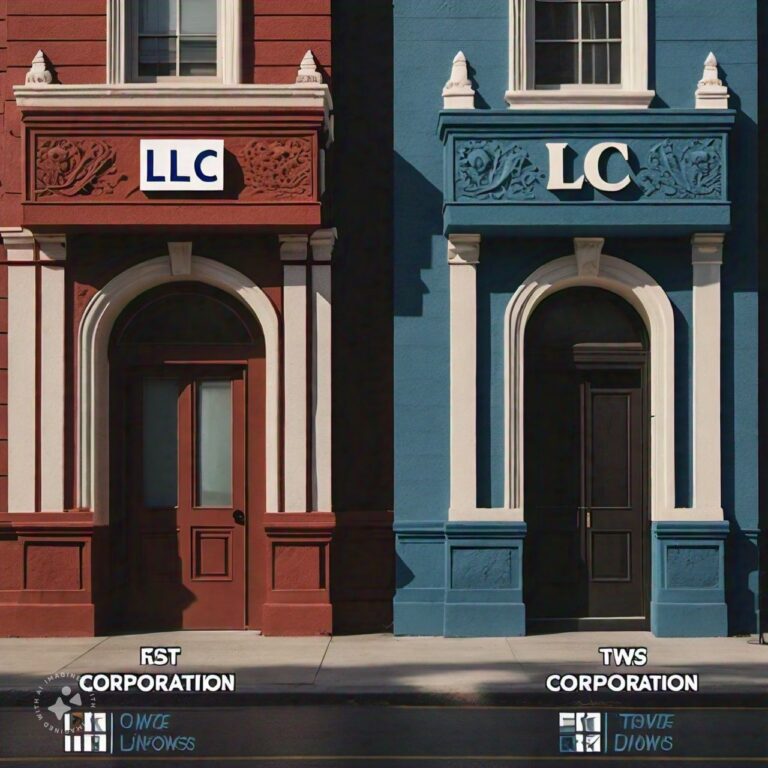
Differences Between LLC and Corporation
Choosing the right business structure is one of the most important decisions entrepreneurs and business owners face. Two of the most common business structures are LLC (Limited Liability Company) and Corporation. While both offer legal protection and liability limitations for their owners, they differ in many aspects such as management structure, tax treatment, regulatory requirements, and ownership flexibility. Understanding these differences is essential for anyone starting a business or transitioning from one structure to another.
This article explores the nuances between LLCs and Corporations, providing detailed insights into their definitions, characteristics, pros and cons, and common use cases. We’ll also address some frequently asked questions to help clarify how each business structure works and who may benefit from them.
LLC Overview
What is an LLC?
An LLC (Limited Liability Company) is a hybrid business structure that combines the liability protection of a corporation with the tax benefits and flexibility of a partnership or sole proprietorship. LLCs are relatively simple to establish and offer flexibility in how the business is managed and taxed.
LLCs are popular among small to medium-sized businesses because they offer personal liability protection, meaning the owners (known as "members") are not personally responsible for the debts and liabilities of the business. This is a key benefit, as it protects the members' personal assets from potential business risks, including lawsuits and creditor claims.
Key Features of an LLC
-
Ownership: LLCs can have one or multiple members, and there are generally no restrictions on the number or type of members. Members can be individuals, corporations, or even other LLCs, which makes ownership flexible.
-
Management Structure: LLCs can be managed either by the members themselves (member-managed) or by designated managers (manager-managed). This provides flexibility in terms of how the business is operated. In a member-managed LLC, the owners actively participate in running the business. In a manager-managed LLC, the owners appoint one or more managers to handle the day-to-day operations.
-
Pass-Through Taxation: One of the most significant advantages of an LLC is pass-through taxation. The profits and losses of the LLC are passed through to the individual members, and the LLC itself is not taxed at the entity level. This avoids the double taxation that is common with corporations (where profits are taxed at both the corporate and individual levels).
-
Limited Liability Protection: LLC members are generally not personally liable for the debts or obligations of the LLC. This means that creditors can only pursue the assets of the business, not the personal assets of the members, unless there has been some wrongdoing such as fraud.
-
Fewer Formalities: Unlike corporations, LLCs are not required to hold annual meetings, maintain detailed records (like minutes), or adhere to a rigid governance structure. This makes LLCs simpler to manage and more appealing to smaller businesses.
Advantages of an LLC
-
Flexibility: LLCs offer flexibility in ownership, management, and taxation. They can choose how they want to be taxed (as a sole proprietorship, partnership, S Corporation, or C Corporation) and are not subject to the same formalities as corporations.
-
Personal Liability Protection: Members of an LLC have limited liability, which protects their personal assets from business liabilities.
-
Tax Advantages: The pass-through taxation model helps members avoid double taxation, allowing them to report profits and losses on their individual tax returns.
-
Management Simplicity: LLCs do not require a formal board of directors or officers, making the management structure more straightforward compared to corporations.
Limitations of an LLC
-
Self-Employment Taxes: In many cases, LLC members are subject to self-employment taxes on their share of the profits, which can be higher than corporate tax rates.
-
Varying State Laws: LLC regulations and fees can vary significantly from state to state, which can create complexity when operating in multiple states.
-
Limited Growth Potential: LLCs generally find it harder to raise capital compared to corporations, as investors may prefer purchasing stock in a corporation rather than acquiring ownership in an LLC.
Common Use Cases for LLCs
- Small Businesses: LLCs are an ideal structure for small businesses, freelancers, consultants, and partnerships.
- Real Estate Investments: Many real estate investors use LLCs to hold properties because of the liability protection and tax advantages.
- Family-Owned Businesses: LLCs allow for flexible management and ownership, making them suitable for family businesses.
Corporation Overview
What is a Corporation?
A Corporation is a legal entity that is separate from its owners (shareholders). Corporations are designed to offer limited liability protection, meaning that the personal assets of shareholders are protected from the liabilities of the business. Corporations are the preferred structure for larger businesses, especially those seeking to raise capital through the sale of stock.
Corporations are governed by a board of directors and must adhere to a more formal management and governance structure than LLCs. They are also subject to more stringent legal and regulatory requirements, particularly in terms of taxes, reporting, and shareholder rights.
Corporations can be divided into two main types: C Corporations (C Corp) and S Corporations (S Corp). C Corps are the default structure, while S Corps provide certain tax advantages but have restrictions on ownership.
Key Features of a Corporation
-
Separate Legal Entity: A corporation is considered a distinct legal entity from its owners. This means the corporation can own assets, incur liabilities, and enter into contracts in its own name.
-
Ownership: Ownership in a corporation is represented by shares of stock, which can be bought and sold. This allows corporations to raise capital by issuing shares to investors. Ownership can be transferred easily through the sale of stock.
-
Management Structure: Corporations are managed by a board of directors, which is elected by the shareholders. The board oversees the major decisions of the corporation and appoints officers (such as a CEO, CFO, etc.) to manage the day-to-day operations.
-
Double Taxation: In a C Corporation, profits are taxed at both the corporate level and the individual level when dividends are distributed to shareholders. S Corporations, however, allow profits and losses to pass through to shareholders, avoiding double taxation.
-
Regulatory Requirements: Corporations are required to follow strict regulations, including holding annual shareholder meetings, keeping detailed corporate records, and filing regular reports with state and federal authorities.
Advantages of a Corporation
-
Limited Liability: Shareholders of a corporation enjoy limited liability, meaning they are only responsible for the amount of their investment in the corporation, and their personal assets are protected.
-
Ability to Raise Capital: Corporations can issue stock to raise money, making it easier for them to attract investors and finance growth.
-
Perpetual Existence: Unlike sole proprietorships or partnerships, a corporation continues to exist even if the owners or directors change. This makes corporations a more stable and enduring business structure.
-
Attracting Talent: Corporations can offer stock options and other incentives to attract top talent, which is often a key factor for startups and high-growth companies.
Limitations of a Corporation
-
Double Taxation: C Corporations face double taxation, as profits are taxed at the corporate level and again at the individual level when distributed as dividends. S Corporations avoid this but are subject to limitations on ownership and the number of shareholders.
-
Complexity and Cost: Corporations are more complex to form and manage than LLCs. They require more paperwork, regulatory filings, and legal oversight.
-
Formalities: Corporations must follow strict governance rules, such as holding annual meetings, maintaining corporate records, and having a board of directors.
-
Limited Ownership Flexibility: S Corporations have restrictions on the number of shareholders (limited to 100), and all shareholders must be U.S. citizens or residents.
Common Use Cases for Corporations
- Larger Businesses: Corporations are the preferred structure for large companies that plan to raise capital through the sale of stock.
- Startups Seeking Investment: Venture capitalists and angel investors typically prefer corporations due to the availability of stock options and the ability to take the company public.
- Publicly Traded Companies: Corporations are required for companies that plan to go public and list their shares on stock exchanges.
Differences Between LLC and Corporation
While both LLCs and Corporations offer limited liability protection, they differ in several key areas:
-
Taxation:
- LLC: LLCs offer pass-through taxation, meaning the profits and losses of the business pass through to the members, and the LLC itself is not taxed at the entity level.
- Corporation: C Corporations face double taxation (profits taxed at the corporate and individual levels), while S Corporations offer pass-through taxation but come with restrictions on ownership.
-
Management Structure:
- LLC: LLCs offer flexible management options, allowing members to choose between member-managed or manager-managed structures.
- Corporation: Corporations have a formal management structure, requiring a board of directors to oversee the business and officers to manage day-to-day operations.
-
Regulatory Requirements:
- LLC: LLCs are relatively easy to manage and have fewer formal requirements, such as holding annual meetings or maintaining detailed corporate records.
- Corporation: Corporations are subject to more regulatory oversight and must adhere to formalities such as holding annual meetings, keeping corporate minutes, and filing annual reports.
-
Raising Capital:
- LLC: LLCs may find it more difficult to raise capital, as investors prefer stock ownership in corporations.
- Corporation: Corporations can easily raise capital by issuing shares of stock to investors, making them more attractive to venture capitalists and institutional investors.
-
Ownership Flexibility:
- LLC: LLCs can have an unlimited number of members, including individuals, corporations, and other LLCs.
- Corporation: S Corporations have ownership restrictions, such as limiting the number of shareholders to 100 and requiring all shareholders to be U.S. citizens or residents.
-
Tax Flexibility:
- LLC: LLCs can choose how they are taxed (sole proprietorship, partnership, or corporation), providing more flexibility in tax planning.
- Corporation: C Corporations face double taxation unless they opt for S Corporation status, which limits ownership and the number of shareholders.
-
Lifespan:
- LLC: The lifespan of an LLC is often tied to the participation of its members unless provisions for continuity are established.
- Corporation: Corporations have perpetual existence, meaning the business continues to exist even if the owners or directors change.
Conclusion
Choosing between an LLC and a Corporation depends on the specific needs and goals of the business. LLCs offer flexibility, simpler management, and tax advantages, making them a popular choice for small businesses, partnerships, and entrepreneurs. On the other hand, Corporations provide a more formal structure, easier access to investment capital, and the potential for perpetual existence, which can be beneficial for larger businesses and companies planning to go public.
Understanding the differences between LLCs and Corporations, particularly regarding taxation, management, liability, and ownership, can help business owners make informed decisions about the best structure for their business. By carefully considering the pros and cons of each option, entrepreneurs can choose the entity that aligns with their long-term vision and operational needs.
FAQs
Related Topics
- All
- Animals
- Diseases
- Health
- Money
- Politics
© 2024 OnYelp.com. All rights reserved. Terms and Conditions | Contact Us | About us





